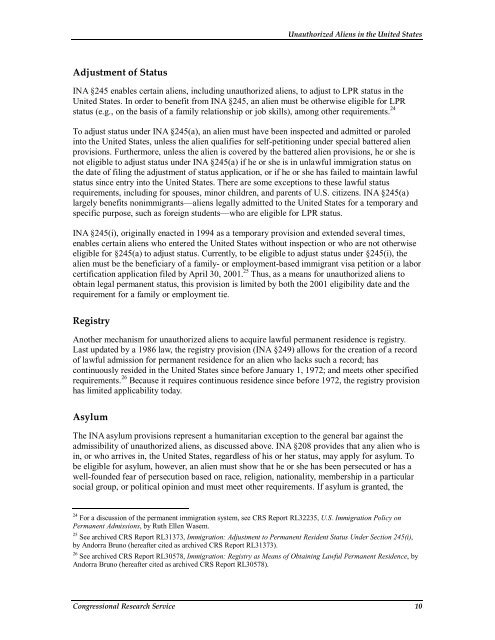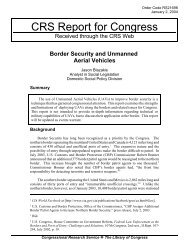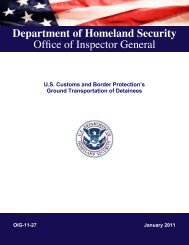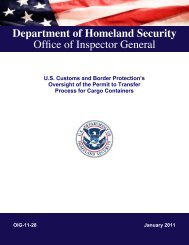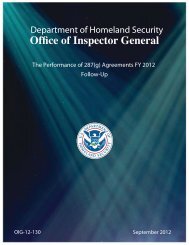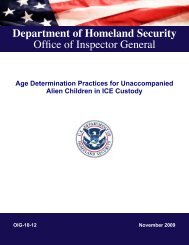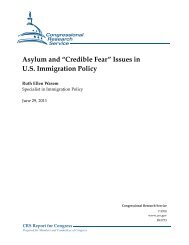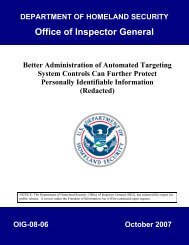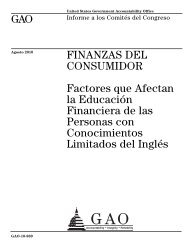Unauthorized Aliens in the United States - Federation of American ...
Unauthorized Aliens in the United States - Federation of American ...
Unauthorized Aliens in the United States - Federation of American ...
Create successful ePaper yourself
Turn your PDF publications into a flip-book with our unique Google optimized e-Paper software.
<strong>Unauthorized</strong> <strong>Aliens</strong> <strong>in</strong> <strong>the</strong> <strong>United</strong> <strong>States</strong><br />
Adjustment <strong>of</strong> Status<br />
INA §245 enables certa<strong>in</strong> aliens, <strong>in</strong>clud<strong>in</strong>g unauthorized aliens, to adjust to LPR status <strong>in</strong> <strong>the</strong><br />
<strong>United</strong> <strong>States</strong>. In order to benefit from INA §245, an alien must be o<strong>the</strong>rwise eligible for LPR<br />
status (e.g., on <strong>the</strong> basis <strong>of</strong> a family relationship or job skills), among o<strong>the</strong>r requirements. 24<br />
To adjust status under INA §245(a), an alien must have been <strong>in</strong>spected and admitted or paroled<br />
<strong>in</strong>to <strong>the</strong> <strong>United</strong> <strong>States</strong>, unless <strong>the</strong> alien qualifies for self-petition<strong>in</strong>g under special battered alien<br />
provisions. Fur<strong>the</strong>rmore, unless <strong>the</strong> alien is covered by <strong>the</strong> battered alien provisions, he or she is<br />
not eligible to adjust status under INA §245(a) if he or she is <strong>in</strong> unlawful immigration status on<br />
<strong>the</strong> date <strong>of</strong> fil<strong>in</strong>g <strong>the</strong> adjustment <strong>of</strong> status application, or if he or she has failed to ma<strong>in</strong>ta<strong>in</strong> lawful<br />
status s<strong>in</strong>ce entry <strong>in</strong>to <strong>the</strong> <strong>United</strong> <strong>States</strong>. There are some exceptions to <strong>the</strong>se lawful status<br />
requirements, <strong>in</strong>clud<strong>in</strong>g for spouses, m<strong>in</strong>or children, and parents <strong>of</strong> U.S. citizens. INA §245(a)<br />
largely benefits nonimmigrants—aliens legally admitted to <strong>the</strong> <strong>United</strong> <strong>States</strong> for a temporary and<br />
specific purpose, such as foreign students—who are eligible for LPR status.<br />
INA §245(i), orig<strong>in</strong>ally enacted <strong>in</strong> 1994 as a temporary provision and extended several times,<br />
enables certa<strong>in</strong> aliens who entered <strong>the</strong> <strong>United</strong> <strong>States</strong> without <strong>in</strong>spection or who are not o<strong>the</strong>rwise<br />
eligible for §245(a) to adjust status. Currently, to be eligible to adjust status under §245(i), <strong>the</strong><br />
alien must be <strong>the</strong> beneficiary <strong>of</strong> a family- or employment-based immigrant visa petition or a labor<br />
certification application filed by April 30, 2001. 25 Thus, as a means for unauthorized aliens to<br />
obta<strong>in</strong> legal permanent status, this provision is limited by both <strong>the</strong> 2001 eligibility date and <strong>the</strong><br />
requirement for a family or employment tie.<br />
Registry<br />
Ano<strong>the</strong>r mechanism for unauthorized aliens to acquire lawful permanent residence is registry.<br />
Last updated by a 1986 law, <strong>the</strong> registry provision (INA §249) allows for <strong>the</strong> creation <strong>of</strong> a record<br />
<strong>of</strong> lawful admission for permanent residence for an alien who lacks such a record; has<br />
cont<strong>in</strong>uously resided <strong>in</strong> <strong>the</strong> <strong>United</strong> <strong>States</strong> s<strong>in</strong>ce before January 1, 1972; and meets o<strong>the</strong>r specified<br />
requirements. 26 Because it requires cont<strong>in</strong>uous residence s<strong>in</strong>ce before 1972, <strong>the</strong> registry provision<br />
has limited applicability today.<br />
Asylum<br />
The INA asylum provisions represent a humanitarian exception to <strong>the</strong> general bar aga<strong>in</strong>st <strong>the</strong><br />
admissibility <strong>of</strong> unauthorized aliens, as discussed above. INA §208 provides that any alien who is<br />
<strong>in</strong>, or who arrives <strong>in</strong>, <strong>the</strong> <strong>United</strong> <strong>States</strong>, regardless <strong>of</strong> his or her status, may apply for asylum. To<br />
be eligible for asylum, however, an alien must show that he or she has been persecuted or has a<br />
well-founded fear <strong>of</strong> persecution based on race, religion, nationality, membership <strong>in</strong> a particular<br />
social group, or political op<strong>in</strong>ion and must meet o<strong>the</strong>r requirements. If asylum is granted, <strong>the</strong><br />
24 For a discussion <strong>of</strong> <strong>the</strong> permanent immigration system, see CRS Report RL32235, U.S. Immigration Policy on<br />
Permanent Admissions, by Ruth Ellen Wasem.<br />
25 See archived CRS Report RL31373, Immigration: Adjustment to Permanent Resident Status Under Section 245(i),<br />
by Andorra Bruno (hereafter cited as archived CRS Report RL31373).<br />
26 See archived CRS Report RL30578, Immigration: Registry as Means <strong>of</strong> Obta<strong>in</strong><strong>in</strong>g Lawful Permanent Residence, by<br />
Andorra Bruno (hereafter cited as archived CRS Report RL30578).<br />
Congressional Research Service 10


